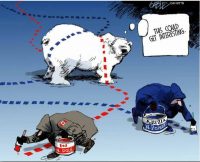
Could Shipwrecks Lead the World to War?
Archaeology has long been exploited as a political tool. Hitler used artifacts and symbols to manufacture a narrative of Aryan racial superiority. The Islamic State proves its zealotry by destroying evidence of ancient history. Underwater archaeology — the world of shipwrecks and sunken cities — has mostly avoided these kinds of machinations, though. Since no one lives beneath the sea, leaders haven’t found many opportunities for political gains from archaeological sites there.
That is, until now.
In the past few years, politicians in Canada, Russia and China have realized that they can use shipwrecks on the sea floor to project their sovereignty into new maritime territories.… Seguir leyendo »







